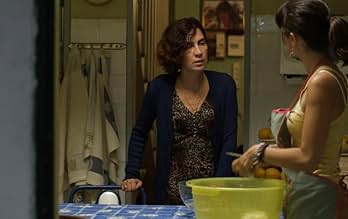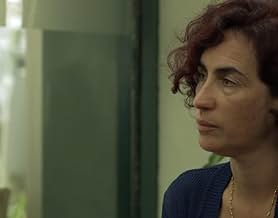CALIFICACIÓN DE IMDb
7.3/10
2.1 k
TU CALIFICACIÓN
Agrega una trama en tu idiomaA regular family living in the outskirts of Lisbon sees the serenity of their lives shaken beyond any remedy within a week.A regular family living in the outskirts of Lisbon sees the serenity of their lives shaken beyond any remedy within a week.A regular family living in the outskirts of Lisbon sees the serenity of their lives shaken beyond any remedy within a week.
- Dirección
- Guionista
- Elenco
- Premios
- 21 premios ganados y 9 nominaciones en total
Maria João Vaz
- Algarvio
- (as João Vaz)
- Dirección
- Guionista
- Todo el elenco y el equipo
- Producción, taquilla y más en IMDbPro
Argumento
¿Sabías que…?
- TriviaPortugal's official submission to the Best Foreign Language Film category of the 85th Academy Awards 2013.
Opinión destacada
Portuguese director Joao Canijo returns with his eighth feature, Blood of My Blood, (his first fictional outing since 2007's Misbegotten) a sprawling, all consuming portrait of one week in the life a matriarchal run familial unit in the slums outside Lisbon, and may indeed be his masterpiece. Inevitably, there's no denying a comparison of technique with Altman and Mike Leigh (Canijo spent two years developing the characters with the actors via a series of workshops as Leigh does), but the film stands quite firmly as an often uncomfortable, unpleasant, and always fascinating family saga that would, in a fair world, finally open up the English speaking market to Canijo's previous directorial efforts, which date back to the early 80s.
In Padre Cruz, a slum on the edge of Lisbon, the Fialho clan, whose workable, but makeshift daily existence is about to be severely shaken. The family matriarch, Marcia (Rita Blanco) has singlehandedly raised her two children, Joca (Rafael Morais) and Claudia (Cleia Almeida), and she works in a restaurant where she has a distant but apparently fulfilling relationship with Helder (Fernando Luis). Marcia's younger sister, Ivete (Anabela Moreira), a hairdresser, also lives with them, her goal to get breast implants in an effort to retain her waning sex appeal, as time seems to be taking its toll on her. Besides daily squabbles and bickering between the usual amiable relatives, which includes Joca's girlfriend, Erica (Wilma de Brito) and Claudia's boyfriend, Cesar (Francisco Tavares) who works a security guard at the same grocery story with Claudia, it's Marcia's children that create a situation that not even the fierce convictions of their flinty mother can put right.
We first meet Joca as he explains to Telmo (Nuno Lopes), the dealer he works for, that he has just been robbed by the buyer he had been sent to meet. Telmo doesn't take this news too easily, and we learn that wild child Joca has been in prison already for drug trafficking. But Telmo's not so sure that Joca's being up front with his missing drugs. Meanwhile, Claudia, currently going to nursing school and planning a wedding with the jealous and needy Cesar, tells her mother she's in love with a married man. Marcia discovers the man, Alberto (Marcello Urgeghe) is one of Claudia's teachers, and travels to Alberto's fancy, upscale neighborhood to confront him about his relationship with Claudia. Throughout several interactions between Alberto and Claudio, we learn varying bits of information that complicate the situation, though something drastic has to take place before either Alberto or Claudia decide to listen to Marcia.
Canijo employs a novel split screen technique in his opening frames, which he repeats several times throughout the feature, using the camera to dissect rooms, using only a wall as separation. On one side, Joca and Telmo heatedly bickering about drug money, with Telmo's two young daughters delicately listening at the breakfast table on the other side, and so on. Canijo often catches characters in the same room or an adjacent space, their conversations overlapping at the same time. But as the film progresses, these busied frames give way to solemn close-ups, grotesquely calming the background to focus on the important and prophetic details we need to clue in on, not unlike tightening the coil of a noose. Even a karaoke bar (presented by Lord Jim Karaoke, a possible nod to Conrad's classic novel concerning the abandonment of a ship in distress) gives us competing, overlapping songs, with Cesar singing a Joe Cocker duet and Ivete crooning "Just Too Good To Be True," to Telmo, a tune which will haunt us again later. We soon leave behind the eerie green nighttime glow in Marcia's apartment, where the camera roves around the property like a hungry insect, until we end up in one sweaty, dark apartment where we observe one of the most upsettingly degrading scenarios (employing, once again, the Four Seasons) you're apt to see this year for the (almost) final outcome of the foolhardy actions of Joca and Claudia.
The two year character preparation obviously paid off for Canijo and his cast. There's definitely a fluidity between the Fialho's, even as they wander through the more sensationally salacious aspects of the narrative. A longer version, clocking in at over three hours, exists, and the material has also been prepared to air in a three part episode version for television, perhaps a more accessible venue due to its lengthy, but utterly worthwhile, running time. After its final frames, you can't help but ruminate on the monstrously perverted notions of the lengths people are willing to go (as well as what they're not willing to do) for those that are considered, in this perfectly titled film, Blood of My Blood.
In Padre Cruz, a slum on the edge of Lisbon, the Fialho clan, whose workable, but makeshift daily existence is about to be severely shaken. The family matriarch, Marcia (Rita Blanco) has singlehandedly raised her two children, Joca (Rafael Morais) and Claudia (Cleia Almeida), and she works in a restaurant where she has a distant but apparently fulfilling relationship with Helder (Fernando Luis). Marcia's younger sister, Ivete (Anabela Moreira), a hairdresser, also lives with them, her goal to get breast implants in an effort to retain her waning sex appeal, as time seems to be taking its toll on her. Besides daily squabbles and bickering between the usual amiable relatives, which includes Joca's girlfriend, Erica (Wilma de Brito) and Claudia's boyfriend, Cesar (Francisco Tavares) who works a security guard at the same grocery story with Claudia, it's Marcia's children that create a situation that not even the fierce convictions of their flinty mother can put right.
We first meet Joca as he explains to Telmo (Nuno Lopes), the dealer he works for, that he has just been robbed by the buyer he had been sent to meet. Telmo doesn't take this news too easily, and we learn that wild child Joca has been in prison already for drug trafficking. But Telmo's not so sure that Joca's being up front with his missing drugs. Meanwhile, Claudia, currently going to nursing school and planning a wedding with the jealous and needy Cesar, tells her mother she's in love with a married man. Marcia discovers the man, Alberto (Marcello Urgeghe) is one of Claudia's teachers, and travels to Alberto's fancy, upscale neighborhood to confront him about his relationship with Claudia. Throughout several interactions between Alberto and Claudio, we learn varying bits of information that complicate the situation, though something drastic has to take place before either Alberto or Claudia decide to listen to Marcia.
Canijo employs a novel split screen technique in his opening frames, which he repeats several times throughout the feature, using the camera to dissect rooms, using only a wall as separation. On one side, Joca and Telmo heatedly bickering about drug money, with Telmo's two young daughters delicately listening at the breakfast table on the other side, and so on. Canijo often catches characters in the same room or an adjacent space, their conversations overlapping at the same time. But as the film progresses, these busied frames give way to solemn close-ups, grotesquely calming the background to focus on the important and prophetic details we need to clue in on, not unlike tightening the coil of a noose. Even a karaoke bar (presented by Lord Jim Karaoke, a possible nod to Conrad's classic novel concerning the abandonment of a ship in distress) gives us competing, overlapping songs, with Cesar singing a Joe Cocker duet and Ivete crooning "Just Too Good To Be True," to Telmo, a tune which will haunt us again later. We soon leave behind the eerie green nighttime glow in Marcia's apartment, where the camera roves around the property like a hungry insect, until we end up in one sweaty, dark apartment where we observe one of the most upsettingly degrading scenarios (employing, once again, the Four Seasons) you're apt to see this year for the (almost) final outcome of the foolhardy actions of Joca and Claudia.
The two year character preparation obviously paid off for Canijo and his cast. There's definitely a fluidity between the Fialho's, even as they wander through the more sensationally salacious aspects of the narrative. A longer version, clocking in at over three hours, exists, and the material has also been prepared to air in a three part episode version for television, perhaps a more accessible venue due to its lengthy, but utterly worthwhile, running time. After its final frames, you can't help but ruminate on the monstrously perverted notions of the lengths people are willing to go (as well as what they're not willing to do) for those that are considered, in this perfectly titled film, Blood of My Blood.
- eemmacoen
- 12 nov 2012
- Enlace permanente
Selecciones populares
Inicia sesión para calificar y agrega a la lista de videos para obtener recomendaciones personalizadas
- How long is Blood of My Blood?Con tecnología de Alexa
Detalles
- Tiempo de ejecución2 horas 11 minutos
- Color
- Mezcla de sonido
- Relación de aspecto
- 1.85 : 1
Contribuir a esta página
Sugiere una edición o agrega el contenido que falta

Principales brechas de datos
By what name was Sangue do Meu Sangue (2011) officially released in Canada in English?
Responda






























